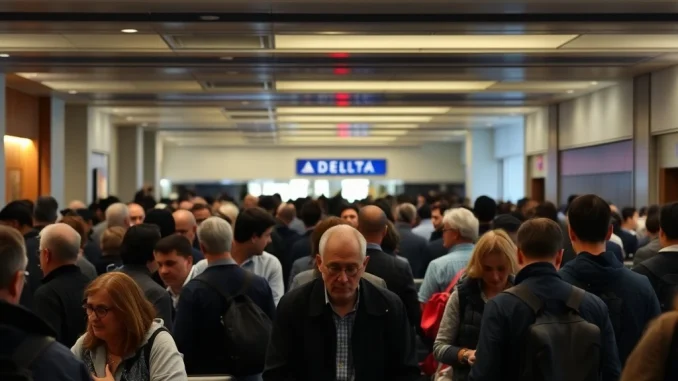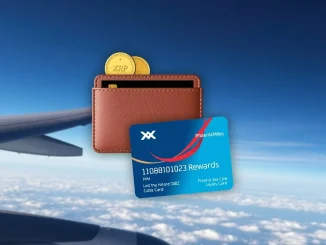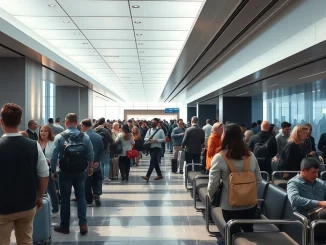
In the evolving landscape of digital assets and Web3, where exclusive communities and token-gated access are becoming increasingly common, the challenges faced by traditional industries offer valuable lessons. Just as blockchain projects grapple with scaling, user experience, and maintaining value for early adopters, airlines like Delta are confronting their own version of ‘elite overproduction.’ The recent dramatic changes to Delta lounge access policies serve as a fascinating case study in how even well-intentioned efforts to democratize luxury can lead to a crisis of exclusivity, mirroring the growing pains seen in some rapidly expanding crypto ecosystems. What happens when everyone gets a ‘golden ticket’? Let’s dive into Delta’s dilemma and what it means for premium experiences, both in the skies and potentially in the decentralized future.
The Unprecedented Challenge of Sky Club Crowding
Delta Air Lines, a titan in the premium travel sector, finds itself at a crossroads in 2025. Despite robust second-quarter earnings and a promising financial outlook, the airline is grappling with a significant issue that has irked its most loyal customers: severe Sky Club crowding. What was once a serene oasis for elite travelers has transformed into a bustling, often chaotic, waiting area. CEO Ed Bastian openly acknowledged the airline’s ‘struggle with our own success,’ as the post-pandemic ‘revenge travel’ phenomenon led to an unanticipated surge in lounge usage, far outstripping capacity.
This problem isn’t merely an inconvenience; it’s an erosion of the very promise of exclusivity that premium travel offers. Passengers who invest heavily in status and credit card perks expect a certain level of comfort and distinction, only to find themselves jostling for space. The airline’s initial attempts to mitigate this, such as restricting Basic Economy access and capping credit cardholder visits, were met with significant backlash, underscoring the deep emotional connection customers have to these perceived privileges.
Understanding Surging Premium Travel Demand
The core of Delta’s predicament lies in the democratization of luxury travel. The airline’s immensely popular Delta SkyMiles loyalty program, coupled with strategic partnerships with premium credit card issuers like American Express, has dramatically expanded the pool of eligible lounge users. With over 10 million SkyMiles members, and increased eligibility stemming from various credit card tiers, the number of individuals with lounge access has simply outpaced the physical infrastructure designed to accommodate them. Delta itself reported ‘unprecedented engagement’ in its loyalty program, a testament to its success, yet also the root cause of the current strain.
Consider these factors contributing to the surge in premium travel demand:
- Post-Pandemic ‘Revenge Travel’: A strong desire among consumers to make up for lost travel opportunities during lockdowns, often opting for more luxurious experiences.
- Democratization of Perks: Premium credit cards and loyalty programs have made lounge access attainable for a broader segment of the upper-middle class, not just the ultra-wealthy.
- Increased Eligibility: As more people qualify for higher credit card tiers or accumulate SkyMiles, the number of potential lounge users grows exponentially.
- Perception of Value: For many, lounge access is a tangible benefit that justifies annual credit card fees or continued loyalty to an airline, leading to higher utilization rates.
The Theory of Elite Overproduction and Its Impact
This phenomenon extends beyond airport lounges and finds a compelling explanation in the theory of ‘elite overproduction,’ popularized by University of Connecticut professor Peter Turchin. This concept posits that modern societies produce more individuals with elite credentials and aspirations than there are high-status roles or perks to distribute. In the context of airport lounges, the ‘overproduction’ of what Turchin terms ‘low-rank elites’ – households with six-figure incomes and premium credit cards – has inadvertently diluted the exclusivity once associated with such spaces.
Turchin argues that this oversupply creates a ‘zero-sum’ environment where even the upper-middle class feels increasingly under-rewarded. Their significant investments in education, status symbols, and premium spending yield diminishing returns as the very perks they seek become commonplace. Social media platforms are now rife with complaints about long lines, diminished service, and the general loss of the ‘special’ feeling in what was once an elite space. This mirrors a broader societal shift where traditional markers of success and distinction are becoming increasingly elusive as more people attain them.
Delta’s Strategic Response: Restricting Delta Lounge Access
Recognizing the severity of the problem, Delta has implemented a multi-pronged strategy to regain control over Delta lounge access and restore the premium experience. These measures, while necessary, have been controversial among some loyal customers:
Key Access Restrictions (Effective February 2025):
- Annual Visit Cap for Amex Cardholders: A limit of 15 annual lounge visits for most American Express cardholders. Unlimited access now requires an annual spending of $75,000 or more on eligible Delta Amex cards.
- Time-Based Entry: Lounge entry is now restricted to three hours before a flight’s scheduled departure, preventing travelers from using lounges for extended periods or during layovers without a connecting flight.
- Permanent Basic Economy Ban: Basic Economy ticket holders are permanently barred from lounge access, regardless of their SkyMiles status or credit card.
In parallel with these restrictions, Delta is also investing heavily in infrastructure upgrades and expansion:
- New Lounge Openings: Plans to open new, larger Delta Sky Club locations, including dedicated Delta One lounges in key hubs like Seattle and Los Angeles, offering enhanced amenities such as spa services.
- Renovations and Expansions: Existing lounges are undergoing renovations and expansions to increase capacity and improve the overall guest experience.
Delta executives project that these combined measures will largely resolve the crowding issues by 2026, aiming to strike a new balance between accessibility and exclusivity.
The Broader Implications Beyond Airport Lounges
Delta’s struggle to manage its premium offering is a microcosm of a larger societal trend. As Turchin highlights, the phenomenon of elite overproduction manifests in various sectors, from education, where credential inflation devalues traditional degrees, to employment, where competition for high-status jobs intensifies. The airline’s predicament underscores the inherent tension between democratizing luxury and preserving the perception of distinction. While Delta’s operational fixes may alleviate physical congestion, they don’t fully address the deeper cultural anxiety: in an era where premium experiences are increasingly accessible, the sense of true distinction once associated with wealth and status becomes more elusive.
Critics suggest that Delta’s solutions might be temporary bandages. Peak-hour congestion in flagship lounges persists, and even newer facilities occasionally face design flaws that undermine their intended purpose. The airline’s ultimate success in restoring the ‘premium experience’ will depend not just on physical upgrades, but on its ability to manage customer expectations in a world where ‘elite status’ is no longer a truly scarce commodity. As observers like Noah Smith and Freddie DeBoer have noted, the malaise of the upper-middle class reflects a broader crisis of meaning in a meritocratic system that promises distinction but often delivers parity.
Delta’s efforts to navigate this complex landscape of accessibility versus exclusivity highlight the ongoing challenge for brands serving an affluent, yet increasingly ‘over-served,’ customer base. While the airline’s 2026 projections offer a hopeful outlook, the broader question lingers: in an age defined by elite overproduction, can any brand truly reclaim the magic and allure of genuine exclusivity?
Frequently Asked Questions (FAQs)
Q1: Why is Delta cutting lounge access?
Delta is cutting lounge access primarily due to severe overcrowding in its Sky Clubs, exacerbated by surging premium travel demand and the widespread availability of lounge access through credit card partnerships and loyalty programs. The goal is to restore the exclusive and comfortable experience for premium travelers.
Q2: How will the new Delta lounge access rules impact Amex cardholders?
Starting February 2025, most American Express cardholders with Delta Sky Club access will be limited to 15 lounge visits per year. Unlimited access will require an annual spending of $75,000 or more on eligible Delta Amex cards.
Q3: What is ‘elite overproduction’ in the context of airport lounges?
‘Elite overproduction’ refers to a theory where society produces more individuals with elite credentials or aspirations than there are high-status roles or perks available. In airport lounges, it means that so many people now qualify for lounge access (the ‘low-rank elites’) that the lounges become overcrowded, diluting the exclusivity that once defined them.
Q4: When will Delta’s lounge crowding issues be resolved?
Delta executives project that the combination of new access restrictions and ongoing infrastructure upgrades (new lounges, expansions) will largely resolve the Sky Club crowding issues by 2026.
Q5: Can Basic Economy passengers still access Delta Sky Clubs?
No, Basic Economy ticket holders are permanently barred from Delta Sky Club access, regardless of their SkyMiles status or associated credit cards, as part of the new policy changes.
Q6: What other measures is Delta taking to improve the lounge experience?
In addition to access restrictions, Delta is investing in significant infrastructure upgrades. This includes opening new, larger Delta Sky Club locations (like dedicated Delta One lounges in Seattle and Los Angeles) and renovating/expanding existing facilities to increase capacity and enhance amenities.



